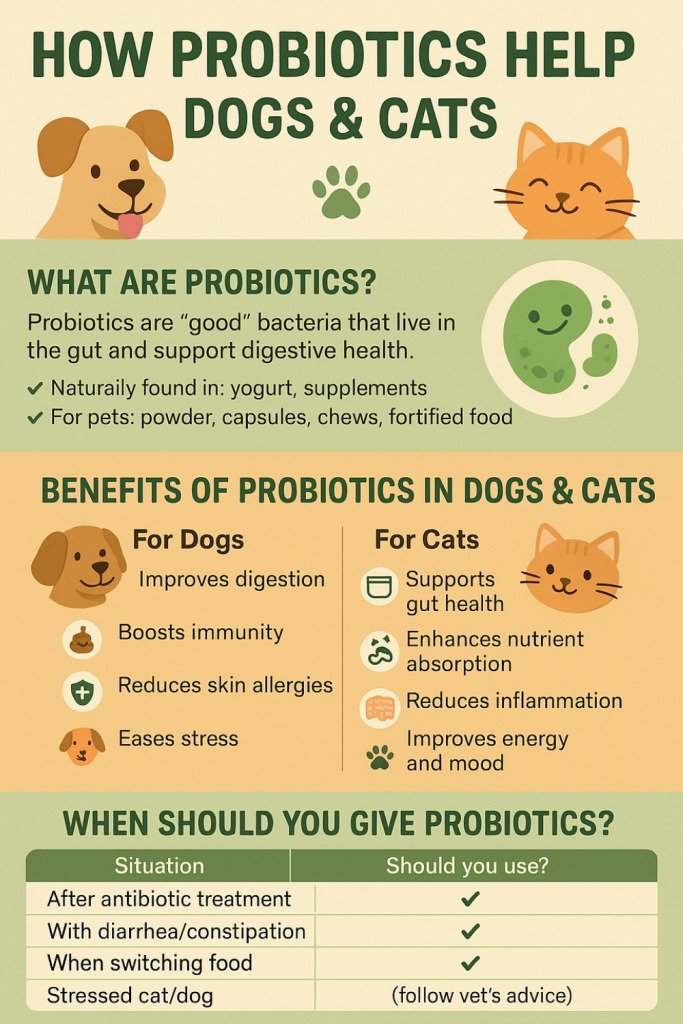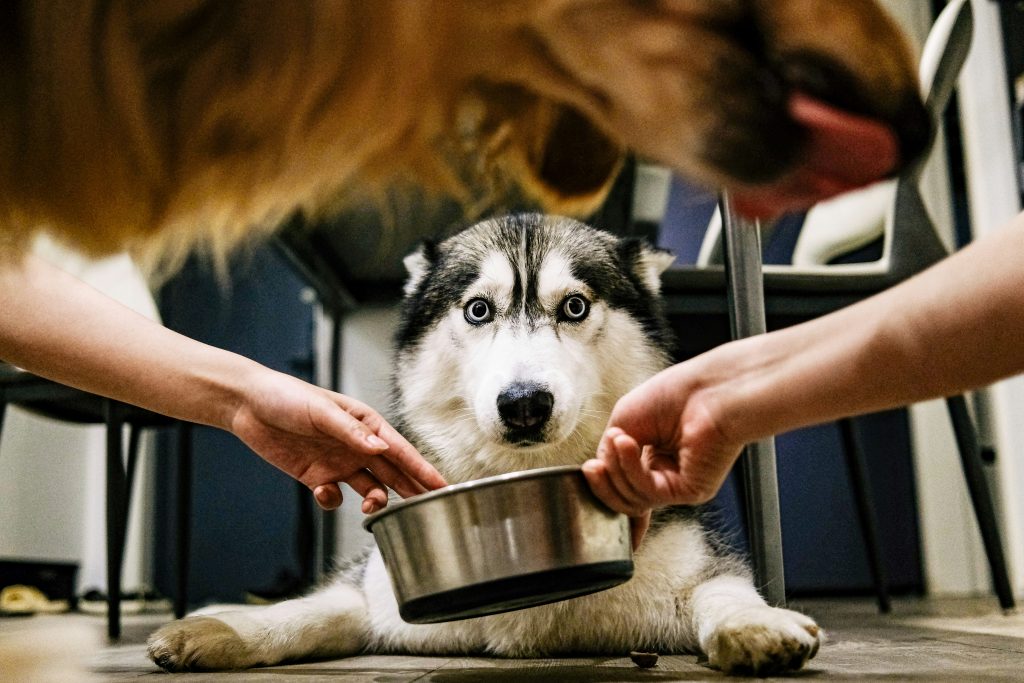Introduction: Understanding Probiotics
Probiotics are live beneficial microorganisms, primarily bacteria, that provide numerous health benefits when consumed in adequate amounts. Commonly associated with improving human digestive health, probiotics also play a significant role in maintaining and enhancing the health of pets, particularly dogs and cats. These beneficial microbes reside naturally in the gastrointestinal (GI) tract, helping maintain a balanced gut environment essential for overall wellness.
The Microbiome: Why It Matters for Your Pet
Pets, much like humans, possess a complex ecosystem of microorganisms known as the microbiome. The microbiome consists of trillions of microbes, including bacteria, fungi, viruses, and protozoa, predominantly found in the digestive tract. A balanced microbiome promotes healthy digestion, nutrient absorption, immune function, and even influences mood and behavior.
When this delicate microbial balance is disrupted—a condition known as dysbiosis—it can lead to various health problems such as gastrointestinal upset, weakened immunity, skin issues, and allergies. Factors that commonly disrupt a pet’s microbiome include antibiotics, dietary changes, stress, and illness.

Differences Between Human and Pet Probiotics
While probiotics for humans and pets may seem similar, they differ significantly due to variations in gut flora between species. Human probiotics often include strains such as Lactobacillus acidophilus and Bifidobacterium lactis, specifically beneficial to human digestive systems. Pet-specific probiotics, however, incorporate strains more suitable for dogs and cats, such as Enterococcus faecium, Bifidobacterium animalis, and certain Lactobacillus strains proven to thrive in animal digestive systems.
Using human probiotics for pets may not harm them but typically lacks effectiveness because the strains may not colonize or positively impact the pet’s gut flora efficiently.

How Probiotics Work in Pets
Probiotics benefit pets through several key mechanisms:
1. Restoring Balance: Probiotics replenish beneficial bacteria, helping restore microbial balance in the digestive tract, especially after disruptions caused by antibiotics or illness.
2. Enhancing Digestive Efficiency: These microorganisms aid in breaking down complex nutrients, facilitating better digestion and nutrient absorption.
3. Immune System Support: Probiotics stimulate the gut-associated lymphoid tissue (GALT), enhancing immune responses and reducing inflammation.
4. Competitive Exclusion: Beneficial bacteria compete with harmful pathogens for nutrients and attachment sites, reducing the chances of infections.
Benefits of Probiotics for Pets
Digestive Health:
- Reduces symptoms of diarrhea and gastrointestinal distress, especially after antibiotic treatments.
- Supports pets with sensitive stomachs, chronic gastrointestinal issues, or food intolerance.
- Helps manage conditions such as inflammatory bowel disease (IBD).
Immune System Enhancement:
- Strengthens the pet’s natural defenses against infections.
- Helps puppies and kittens build a robust immune system early in life.
Skin and Allergy Improvement:
- Reduces allergic reactions and inflammation by modulating immune responses.
- Supports pets suffering from allergies or dermatitis, often resulting in healthier skin and fur.
Stress Reduction:
- Helps maintain gastrointestinal balance during stressful events such as moving, traveling, or boarding.

Signs Your Pet Might Need Probiotics
Pet owners should consider probiotics if their pets exhibit signs of an imbalanced microbiome, such as:
- Frequent diarrhea or constipation
- Excessive gas or bloating
- Persistent skin irritation or allergies
- A weakened immune system, evidenced by frequent illness
- Recent or ongoing antibiotic therapy
- Stress-related digestive upsets
Types of Probiotics for Pets
Probiotics for pets come in various strains and delivery methods:
Commonly Used Strains:
- Enterococcus faecium: Effective in reducing diarrhea and improving stool quality.
- Bifidobacterium animalis: Supports digestive and immune health.
- Lactobacillus acidophilus: Aids digestion and supports gut flora balance.
- Saccharomyces boulardii: Beneficial yeast effective against diarrhea, particularly antibiotic-associated diarrhea.
Forms of Probiotics:
- Powders: Easily mixed with food; suitable for picky eaters.
- Capsules/Tablets: Convenient for precise dosing; can be given directly or hidden in treats.
- Chews: Palatable and easy to administer; ideal for daily supplementation.
- Liquids: Useful for pets with difficulty swallowing pills or capsules.
How to Choose the Right Probiotic for Your Pet
When selecting probiotics, consider the following:
- Strain Specificity: Ensure the probiotic contains strains proven effective for your pet’s condition.
- CFU Count (Colony Forming Units): Typically, probiotics should provide at least 1 billion CFUs per serving for effective results.
- Quality and Storage: Choose reputable brands with clear labeling. Some probiotics require refrigeration, while others are shelf-stable.
- Product Form: Select a delivery method that suits your pet’s preference and lifestyle.

Safety, Side Effects, and Precautions
Probiotics are generally safe for healthy pets. However, some pets may experience temporary mild gastrointestinal symptoms such as gas or soft stools when starting probiotics. Introduce probiotics gradually and observe your pet closely. Discontinue use and consult your veterinarian if severe or persistent adverse reactions occur.
Always consult a veterinarian before starting probiotics, especially for pets with compromised immune systems, severe illnesses, or chronic conditions.
Guidelines for Effective Use
- Administer probiotics consistently to maintain their beneficial effects.
- Follow product guidelines for dosage based on your pet’s size and health condition.
- Store probiotics correctly to maintain viability.
- Avoid administering probiotics simultaneously with antibiotics; instead, provide probiotics a few hours apart from antibiotics.
Conclusion: Probiotics as a Vital Component of Pet Health
Probiotics offer pet owners an effective tool to enhance their pets’ digestive health, boost immunity, alleviate allergies, and improve overall well-being. Understanding how probiotics work and selecting the right products tailored specifically for pets can significantly contribute to a happier, healthier life for your furry companion.
By carefully considering your pet’s unique needs and consulting with veterinary professionals, probiotics can become an essential part of maintaining your pet’s optimal health.

Leave a Reply